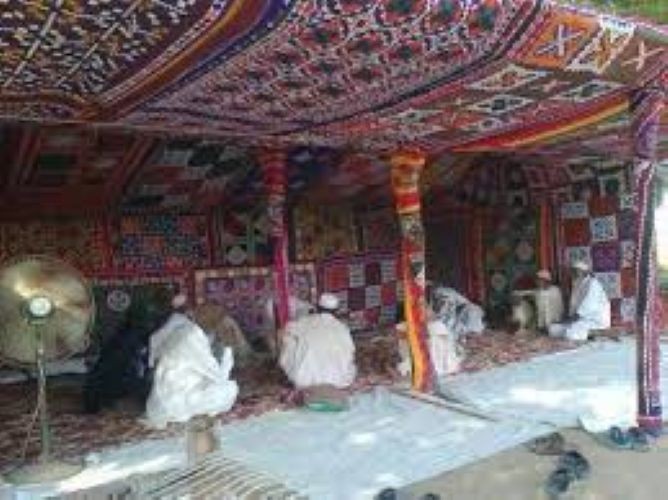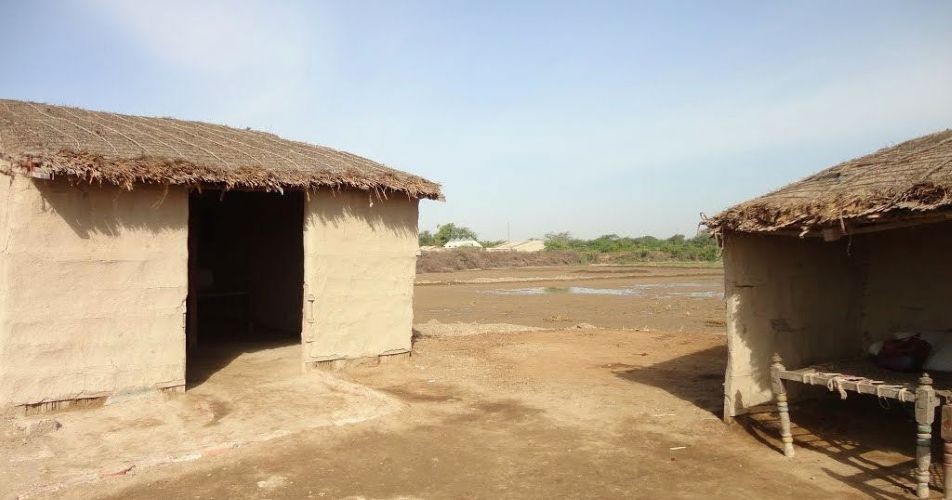Anthropological study of causes behind vanishing culture of Otaqs, the traditional Guesthouses
Culture in terms of anthropology is the shared way of thinking and behaving of a group of people. This can be seen as the similarities found within a group of people. Culture helps a group of people to survive. There are many things in every culture to represent their cultural peculiarity. Sindh is a historic land of civilization and there are many cultural things that make Sindh famous worldwide and Otaq is one of them.
Otaq is a meeting place for people in the village where villagers gather and discuss daily life matters. They also talk about the weather, the crops, their problems and difficulties. Otaq is often used in the evening when the villagers return from their fields and work.
‘Otaq (Urdu-Baithak) is derived from the “Turkish” Language, which is said to be a place of conversation or a sitting place, and that place which is separate from home and is also called a “Guestroom” where the peoples treat them as guest (encyclopedia sindhiana).’
The poets of Sindh have often sung the word Otaq in their poetry. Most of the village people in Sindh have an Otaq which they use to welcome guests, as a gesture of hospitality, which is an important and unique part of the culture of Sindh. In certain cases, the separate guestrooms, called ‘Otaq’, are built at a short distance from the house, where travelers are given special care and hospitality. In Otaq, guests are provided with bread, tea, lassi (A drink made from yogurt) and other food items and beds are also provided to them for stay. The host never asks the guest how many days he will stay there. In Sindhi society, a guest is considered as sent by God.

 Famous Sindhi Sufi Poet Shah Abdul Latif Bhittai has also mentioned Otaq in his poetry as:
Famous Sindhi Sufi Poet Shah Abdul Latif Bhittai has also mentioned Otaq in his poetry as:
اڄ نه اوطاقن ۾ طالب تنوارين،
آديسي اٿي ويا مڙھيون مون مارين
جي جيءَ کي جيارين سي لاھوتي لڏي ويا
Otaq is the symbol of culture for people of Sindh from ancient times. Even today, you will find a small to large Otaq in villages, where guests will be served. Another important function of the Otaq was that whenever there was a crime, or any unwanted incident happened, the whole village would gather in the Otaq of the Wadera or Notable ( چڱو مڙس ), where the notable person, in the presence of other villagers would hear and decide the matter. Such gatherings were also called ‘Punchayat’.
With the growth of social relations, Otaq was established in Sindh, and with the passage of time, the Otaq system reached its peak and along with it, the people in the Otaqs developed different customs and traditions. The customs that the people used to do in the Otaqs began to be practiced. In these circles, community decisions, marriages, death and happy days were also celebrated and slowly it became customary to keep the culture of Otaq. About 80 percent of the gatherings in any town or village involve the use of Otaq.
Unfortunately over time the system of Otaq is less visible in villages and towns, as the Otaq system is vanishing day by day for several reasons, including population growth, unavailability of land, costly construction, increasing poverty etc.
During my field research on Otaq, many of respondents shared many thoughts. According to them, Otaq system is losing its importance nowadays due to the mobile phone in which people communicate online through different apps and children are engaged in playing different games.
Some people said that most of the people are keeping alive the tradition of Sindh by maintaining Otaqs in villages, towns and even in cities. Rich people have built luxurious structures while the poor villagers have a small space in which they try their best to keep the guest comfortable and happy. However, Otaq is used more in villages than in cities. Some people argued that there are many reasons behind the demise of Otaqs, including poverty, low incomes, rising property prices, and lack of land to build Otaq.


Otaq in a small village
Gone are the days when the people used to gather at Otaqs and shared the folklore, stories of oral history, and talked about horses and other animals, agricultural lands etc. That era has been replaced with topics of politics, mobile phones. The use of profanity and backbiting is also a reason behind downfall of Otaq.
In my view, still today the culture of Otaq and hospitality of Sindhi people are famous among all. Although the system of Otaq culture is hit badly, it could be revived and promoted with some efforts. According to my observations, native people could not spend much time at Otaq due to the inflation and rise in the unemployment. The middle class is affected the most and it has caused the decline in the culture of Otaq. People have to look after their families’ needs first due to rise in prices of essential commodities. They have limited time and resources to spend at Otaqs.
We need to give more importance to the Otaq system and save the culture of hospitality.
________________
Published under International Cooperation with "Sindh Courier"

Comments